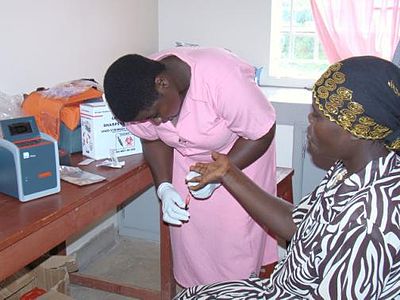15Sep2017
Types and predictors of partner reactions to HIV status disclosure among HIVinfected adult Nigerians in a tertiary hospital in the Niger Delta
by admin, 0 Comments

Dimie Ogoina, Peter Ikuabe, Ikenna Ebuenyi, Tubonye Harry, Otonyo Inatimi, Ogechi Chukwueke
Department of Medicine and Heart to Heart Clinic, Niger Delta University Teaching Hospital, Okolobiri,
Bayelsa state
Abstract
Background and objective: Our aim was to describe the types and determinants of partner reactions to HIV-status disclosure among adults attending an antiretroviral therapy-(ART) clinic in the Bayelsa State, Nigeria
Methods: A cross-sectional study was undertaken between January and March 2013 among consecutive adult patients who had disclosed their HIV-status to their current sexual partner. Sociodemograhic data and types of initial and subsequent partner reactions to disclosure were obtained using interviewer- administered standardized-questionnaire. Independent determinants of reactions to disclosure were ascertained by unconditional logistic regression.
Results: Out of 123 study participants, 57.7% were females, 92% were receiving ART and 86.1% were currently married. Majority of the participants reported predominant positive or supportive initial (72.4%) and subsequent (89.5%) partner reactions to disclosure, with signifcant increase in positive reactions over time. Positive initial partner reactions were independently associated with prior post- test counselling-(Odds ratio [OR]-6.5, 95% Confdence interval [CI]-1.3-31.6-p=0.02), age>35years-(OR-5.8, 95% CI-1.6-20.9-p=0.008) and being healthy at time of disclosure-(OR-7.8, 95% CI-1.7-35.4-p=0.008). Subsequent positive partner reactions were signifcantly associated with receiving antiretroviral therapy and having only one lifetime sexual partner.
Conclusion: Our results indicate that partner reactions to HIV-status disclosure are predominantly supportive. Disclosure counselling and early initiation of ART may be effective in improving HIV-status disclosure in Nigeria.
Keywords: HIV-disclosure, sexual partners, disclosure reactions, Counselling, antiretroviral therapy, Nigeria.
DOI: http://dx.doi.org/10.4314/ahs.v15i1.2
Recent Posts
- Editor’s choice: Tackling infectious diseases, NCDs and sexual reproductivehealth issues as we enter our 24th year of remarkable growth
- Preconception and contraceptive care for women living with HIV/AIDSattending antiretroviral treatment clinics in Lagos State, Nigeria
- Effects of SNPs on TNF-α and IL-10 cytokine expression in TB and HIVpatients in the Capricorn district, Limpopo Province, South Africa
- Prevalence of Schistosomiasis in a neglected community, South western Nigeria at two points in time, spaced three years apart
- Review of Leishmaniasis in the Middle East and North Africa
Recent Comments
Categories
- 2001 Issues
- 2002 Issues
- 2003 Issues
- 2004 Issues
- 2005 Issues
- 2006 Issues
- 2007 Issues
- 2008 Issues
- 2009 Issues
- 2010 Issues
- 2011 Issues
- 2012 Issues
- 2013 Issues
- 2014 Issues
- 2015 Issues
- 2016 Issues
- 2017 Issues
- 2018 Issues
- 2019 Issues
- 2024 Issues
- Articles
- December issue
- December Release
- June Issue
- June Release
- March Issue
- March Issue
- March Release
- News
- number / volume 2
- number /volume 1
- number /volume 1
- number /volume 1 2008
- number 1
- number 1
- number 1
- number 1
- number 1
- number 1
- number 1
- number 2
- number 2
- number 2
- number 2
- number 2
- number 2
- number 2
- number 2 special Issue
- number 2 special Issue 2
- number 3
- number 3
- number 3
- number 3
- number 3
- number 3
- number 3
- number 4
- number 4
- number 4
- number 4
- number 4
- number 4
- number/ volume 3 2008
- number/ volume 4 2008
- number/volume 1
- number/volume 1
- number/volume 2
- number/volume 2
- number/volume 2 2008
- number/volume 3
- number/volume 3
- number/volume 3
- number/volume 4
- number/volume1
- September Issue
- September Release
- Special Edition
- special Issue
- Uncategorized
- Vol. 24 No. 1 (2024)
- volume 1
- volume 1
- volume 1
- volume 2
- volume 2
- volume 2
- volume 2
- volume 2
- volume 3
- volume 3
- volume 3
- volume 3
- volume 4
- volume 4
- volume 4
- volume 4
- volume1
Categories
- 2001 Issues
- 2002 Issues
- 2003 Issues
- 2004 Issues
- 2005 Issues
- 2006 Issues
- 2007 Issues
- 2008 Issues
- 2009 Issues
- 2010 Issues
- 2011 Issues
- 2012 Issues
- 2013 Issues
- 2014 Issues
- 2015 Issues
- 2016 Issues
- 2017 Issues
- 2018 Issues
- 2019 Issues
- 2024 Issues
- Articles
- December issue
- December Release
- June Issue
- June Release
- March Issue
- March Issue
- March Release
- News
- number / volume 2
- number /volume 1
- number /volume 1
- number /volume 1 2008
- number 1
- number 1
- number 1
- number 1
- number 1
- number 1
- number 1
- number 2
- number 2
- number 2
- number 2
- number 2
- number 2
- number 2
- number 2 special Issue
- number 2 special Issue 2
- number 3
- number 3
- number 3
- number 3
- number 3
- number 3
- number 3
- number 4
- number 4
- number 4
- number 4
- number 4
- number 4
- number/ volume 3 2008
- number/ volume 4 2008
- number/volume 1
- number/volume 1
- number/volume 2
- number/volume 2
- number/volume 2 2008
- number/volume 3
- number/volume 3
- number/volume 3
- number/volume 4
- number/volume1
- September Issue
- September Release
- Special Edition
- special Issue
- Uncategorized
- Vol. 24 No. 1 (2024)
- volume 1
- volume 1
- volume 1
- volume 2
- volume 2
- volume 2
- volume 2
- volume 2
- volume 3
- volume 3
- volume 3
- volume 3
- volume 4
- volume 4
- volume 4
- volume 4
- volume1
